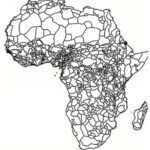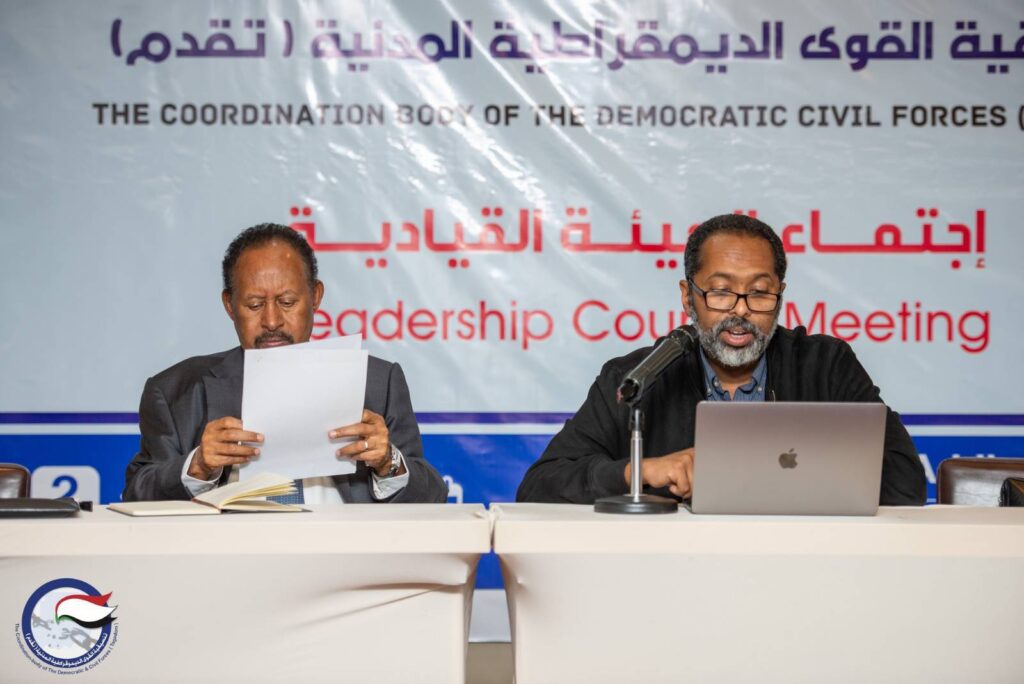By Gill Lusk
The political vacuum has swelled and the Islamist civilian and army leaders are trying their utmost to fill it. Yet this space should rightly be filled, and filled to overflowing, by the civilian alternative, the Coordination of Civilian Democratic Forces, known as Taqaddum, and the peace and justice of which they are the standard-bearers. From young revolutionaries to seasoned politicians, now is their chance.
“Let’s hope we can all celebrate Christmas together in Khartoum next year,” wrote a Sudanese friend in her greetings card last December. Devastated by bombs dropped by Sudan’s own Air Force and heavy artillery fire from both sides, Khartoum today seems a far cry from the Christmas celebrations that I remember from the 1970s. Fir trees from the Forestry Department nursery at Thawra, in peaceful Jebel Marra, lined the main thoroughfare, Sharia el Gasr, and members of the city’s many social clubs celebrated merrily as the whisky moya flowed.
That “far cry” is now a cry of unbearable pain for people who have lost not only relations and friends, not only homes and hometowns, but the life-enhancing hope that filled hearts and minds during the extraordinary Revolution of 2018-19. Lives are lost: even the cautious United Nations puts the death toll at over 16,000. Mainly innocent civilians, they died at the hands of their “own” army, the Sudan Armed Forces, and the paramilitary Rapid Support Forces, which that same army had trained and claimed as its own. These are not the rulers that the public dreamed of during the heady days of the
Revolution.
So where are those potential rulers who can bring Sudan back to sanity? Where is the democratic hope that once sprang so strong? Sudan is a country in mourning – for lost lives and the loss of a future of, as the revolutionary slogan put it, “Freedom, Peace, Justice!’ Tragically, the lives lost cannot be restored. However, most of the nearly nine million people that the UN estimates have been displaced, inside or outside Sudan, may one day return to their areas. if not to the houses flattened by SAF or RSF shells. Whether they will be able, will even want, to return depends in large part on what happens next.
That next stage is happening now! “Taqaddum” is holding its official founding conference in Ethiopia, from 27th to 30th May 2024. Around 600 participants are meeting to prepare a democratic future. Responding to criticism that they were not sufficiently inclusive, the more seasoned civic activists and politicians agreed that youth groups and women’s groups should first hold two days of talks in preparation for the main conference.
This is a historic moment amid the grief of 13 months of war between those soldiers officially tasked with protecting the country. Yet death and displacement have badly dented people’s confidence in the future and things will get worse before they get better. Even envisaging a future is hard when you are fleeing death or acute hunger and debilitating disease, as the world’s asylum seekers know only too well. Famine in Sudan is now “inevitable” and will be “catastrophic,” the East Africa head of the UN World Food Programme, Michael Dunford, last month warned the UK All Party Parliamentary Group (APPG) for Sudan and South Sudan. With both sides blocking emergency aid delivery, that is, sadly, no empty prediction.
Crushed confidence is a major obstacle to action and there is a lack of enthusiasm for Taqaddum among those who once overflowed with boundless joy at the revolution. That makes many people easy prey for the technically sophisticated propaganda of the SAF-Islamist axis, which relentlessly targets Taqaddum and the Forces for Freedom and Change which founded it. Talk of the “national army” as the “least worst” option has grown among some Sudanese who initially could see only the horror of that army bombing the civilians and infrastructure it was supposedly proud to protect.
War-weariness, a tide of criticism from the Sudan Communist Party (which has had difficulty working out where the real enemy lies) and skepticism from liberal Sudanese imbued with a long-standing mistrust of politicians have combined to build a wall of wait-and-see that has not helped a Taqaddum that could benefit from more effective communications. It could also benefit, as could its armchair critics, from a conviction that democracy often means disagreeing but pulling together for the greater good, especially in times of extreme crisis. This is certainly one. And like it or not, there is really no alternative, other than more decades of Islamist military rule. There will be plenty of opportunity for criticism once democracy is established.
The ripples of such caution spread and, though some external involvement is clearly fueling the war – for example, the United Arab Emirates’ military support for the RSF or Egypt’s and Iran’s backing for the SAF’s non-functional “government” – the majority who cherish dreams of peace and justice badly need the political and financial support of democratic governments and international civil society. When international affairs are dominated by the Russia-Ukraine and Israel-Gaza wars, not to mention the spread of isolationist Trumpist populism in many places, countries not deemed globally strategic struggle to win either assistance or column inches.
Though Britain supports the need for a civilian (rather than “civilian-led”) government, it has nevertheless quietly downgraded its Sudan involvement by abolishing the post of Special Envoy for Sudan and South Sudan, replacing it with a Special Envoy in Juba and another for the Horn of Africa and the Red Sea. Few believe that even the most brilliant specialist could follow this vast and complex area in meaningful detail. The APPG and others have complained loudly but in vain.
Similarly puzzling was a May 21 webinar from the USA’s Wilson Center, “Enhancing the Voice of Sudanese Civilians on Issues Key to Ending the War and Restoring Peace.” Despite the title, it barely mentioned Taqaddum or its major gathering four days later.** Since the SAF chief, General Abdel Fattah el Burhan, and the RSF boss, Mohamed Hamdan Dagalo alias Hemedti, jointly (lest we forget) overthrew civilian Prime Minister Abdallah Hamdok in October 2021, Washington has failed to take civilian efforts to restore democracy as seriously as most would wish. Fortunately, some other governments have helped out, but Taqaddum, which Hamdok leads, struggles to be heard as clearly as it needs if Sudan is to escape from the clutches of the Islamist movement that is driving the war. Social media were full of calls to mobilize Islamist supporters just before that war erupted in April 2023 and now SAF is busy recruiting more militia.
The civilians need all the help they can muster, from Sudanese and from powerful outsiders. There is a very large and usually unmentioned elephant in the room. How do you end a war that both sides appear to believe they can win militarily, though neither can, when the leaders of both face the threat of being charged with crimes against humanity, war crimes and quite possibly, genocide? Can you allow them immunity in exchange for ending the war and further, withdrawing from public life and their dreams of power? Intentionally destroying civilian homes, vital national infrastructure and, above all, hospitals, can be classed as war crimes. Both protagonists have committed such devastation.
What is bringing things to a head now is the violence by both sides in Darfur, where its historic regional capital, El Fasher, is held by the SAF and under siege from the RSF, trapping an estimated one and a half million non-combatants. Reinforced by reports from Human Rights Watch and others, this has reminded the world of massacres in Darfur, notably El Geneina.
“Spotlight on Darfur: the implications of ongoing conflict and atrocities” was the title of an on-the-record Chatham House meeting on 16 May. After reminding the audience that the SAF had “trained and deployed” the RSF in the genocide of the 2000s, the Chairperson, former UK Sudan Ambassador Dame Rosalind Marsden, noted that, “…we’re seeing the same actors and methods being used today”. There was “no shortage of documentation or early warning, the problem is a lack of early response and effective preventive action,” she went on. The Prosecutor of the International Criminal Court (ICC), Karim Khan, had told the UN Security Council on January 24 that there was evidence of “Rome Statute crimes,” i.e. genocide, war crimes and crimes against humanity, being committed by both sides.
It fell to international human rights lawyer Yonah Diamond to tell the meeting that there was “clear genocidal intent” and since “the wheels of justice turn at a glacial pace,” international rights lawyers and activists were trying to document cases to put pressure on the governments that are members of the ICC. That membership legally binds them to take action when such crimes are recorded. They had found “the same dynamics in the RSF attacks”, he said, as during the rule of President Omer al Bashir.
The obvious need for justice raises the challenge of why leaders would stop fighting if that means they may spend the rest of their lives behind bars. That’s even before any discussion of rebuilding a shattered country. There are plenty of challenges for the civilian leaders in Taqaddum and they need all the support they can get.
This article was first published by Sudan Transparency and Policy Tracker:

